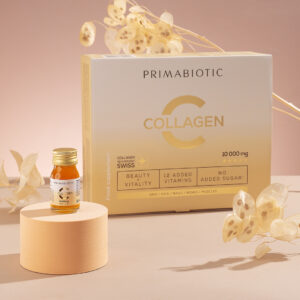
Anti Aging Diet: 5 Essential Rules and the Best Foods for Skin Repair
Increasingly well-documented scientific research indicates that preventing the signs of aging is not solely determined exogenously through skincare treatments. Of particular interest to researchers is the link between diet and a youthful appearance. One such dietary approach is the rejuvenating diet. Check out the key principles you need to remember to maintain a youthful look!
Essential Vitamins – A Key Element of an Anti Aging Diet
Getting enough essential vitamins is one of the most powerful steps you can take when following an anti aging diet. These nutrients support collagen production, protect your skin from free radical damage, and promote cell regeneration – all of which are key to maintaining youthful, glowing skin. When combined with the best foods for skin repair, vitamins such as A, C, E, D can help slow down visible signs of aging from the inside out.
Vitamin E
Vitamin E has been dubbed the “elixir of youth,” making it one of the most important vitamins that a rejuvenating diet should include. It has been proven that, as a powerful antioxidant, it protects the human body against the long-term and harmful effects of environmental factors, preservatives, and other harmful substances found in food.
It slows down the aging processes of the body, minimizes wrinkles, scars from cuts, surgeries or burns, as well as spots and discoloration on the skin.
Vitamin E not only has a great effect on our skin, but it also plays an important role in our rejuvenating diet. A deficiency of vitamin E in the body may lead to fertility problems (especially in men), deteriorated vision, decreased concentration, and neurological dysfunctions related to brain or nerve degeneration.
Vitamin E also serves several preventive functions. It protects against the formation of atherosclerotic plaques and the development of atherosclerosis. Additionally, it has a protective effect on red blood cells and the endothelium. As a result, it contributes to the prevention of heart and cardiovascular diseases.
The best sources of vitamin E include: sunflower oil, rapeseed oil, and soybean oil, as well as olive oil, wheat germ, almonds, hazelnuts, walnuts, and peanuts. It is also found in small amounts in green vegetables.
Vitamin C
Vitamins C and E form a powerful duo of antioxidants, often referred to as the “youth vitamins.” Vitamin C plays a crucial role in the synthesis of fibroblasts – the cells responsible for producing collagen and elastin. Thanks to these proteins, the skin becomes firmer and more elastic.
A rejuvenating diet should be rich in this vitamin, as it also helps strengthen and seal the walls of blood vessels. As a result, the skin appears brighter and more radiant.
The best sources of vitamin C in a rejuvenating diet are primarily fruits and vegetables. Large amounts of this vitamin can be found in parsley leaves, blackcurrants, kiwi, red bell peppers, cruciferous vegetables, strawberries, and citrus fruits.
Vitamin A
This vitamin plays a vital role in skin care – it helps protect against infections and strengthens the immune system. This is particularly important, as an improperly functioning immune system can lead to various skin conditions, such as atopic dermatitis (eczema), vitiligo, psoriasis, alopecia areata, lupus erythematosus, and herpetiform dermatitis. Additionally, a rejuvenating diet rich in vitamin A can help reduce the visible effects of skin aging.
A deficiency in vitamin A can result in increased follicular keratosis, which is often accompanied by dry, flaky skin, as well as brittle hair and nails.
Retinol, the active form of vitamin A, must be supplied through the diet. Sources of inactive provitamins, such as β-carotene, include: egg yolks, vegetables (carrots, spinach, pumpkin, lettuce, broccoli, green peas), and fruits (melons, oranges). Retinyl esters, another form of vitamin A, are found in dairy products, cheese, fish, and meat.
Vitamin D
The vitamin D group consists of chemical compounds collectively known as calciferols. There are two main forms: ergocalciferol (vitamin D2) and cholecalciferol (vitamin D3). The primary role of vitamin D is to support the development and maintenance of healthy bones, which is especially important as the body ages. It also helps regulate calcium levels in teeth and shows beneficial effects in the healing of skin wounds.
The content of vitamin D3 (cholecalciferol) in food products is relatively low. It is found in the highest amounts in fish such as mackerel, carp, and trout – although these are not consumed frequently enough in Poland. Vitamin D2 (ergocalciferol), on the other hand, is found in certain plants and fungi. For example, champignon mushrooms contain 1.9 µg/100g and porcini mushrooms 3.1 µg/100g. It is also present in shiitake mushrooms, oyster mushrooms, and baker’s yeast. Apart from food sources, vitamin D2 and D3 are also available in various pharmaceutical products, commonly known as supplements.
Anti Aging Foods Rich in Minerals for Skin Repair and Longevity
Minerals are just as important as vitamins when it comes to an anti aging diet. They play a vital role in maintaining skin elasticity, strengthening connective tissues, and supporting overall cellular health. Incorporating anti aging foods rich in minerals such as zinc, selenium, and iron can accelerate the body’s natural healing processes and promote smoother, firmer skin. These are among the best foods for skin repair and longevity, helping you preserve a youthful glow for years to come.
Zinc
Zinc plays an important role in apoptosis – the programmed death of cells – as well as in skin aging. This mineral supports the structure and proper function of mucous membranes. It stabilizes the cell membranes of the skin and is involved in the division of basal epidermal cells. Zinc also influences the skin’s immune function by modulating the activity of macrophages, neutrophils, various inflammatory cytokines, and phagocytic activity.
A zinc deficiency can lead to decreased libido, reduced appetite, weight loss, vision problems (night blindness), signs of premature aging, susceptibility to infections, chronic dry eyes, and fatigue. It is also associated with a higher frequency of mental health disorders (such as depression) and neurological issues (e.g., limb tremors, motor impairments, difficulty walking, and impaired sense of taste).
The best dietary sources of zinc include meat, liver, rennet cheeses, whole grain bread, buckwheat, and eggs.
Iron
Iron is one of the most important minerals in the body. It is essential for the production of hemoglobin and for the proper functioning of the circulatory, nervous, and immune systems. Iron deficiency is one of the main causes of anemia, which often manifests as pale or sallow skin and dark circles under the eyes. These are common visible effects of iron deficiency on the skin.
Since iron participates in cellular respiration processes, it also affects the cells in the hair matrix. A deficiency can lead to slowed hair growth, brittleness, breakage, and excessive hair loss. Nails may also be affected, becoming thin, fragile, and prone to splitting. Chronic iron deficiency can lead to spoon-shaped nails (koilonychia) and significant hair loss.
There are two forms of dietary iron: heme iron (found in animal-based foods) and non-heme iron (found in plant-based foods). Foods rich in iron include organ meats, especially liver and kidneys, red meat, parsley leaves, fish, grains, whole grain bread, legumes, beans, nuts, egg yolks, dark green vegetables, potatoes, and iron-fortified products.
Selenium
Another mineral that plays an important role in skin health – and should be included in a rejuvenating diet – is selenium. It supports the immune system and is involved in the synthesis of nucleic acids (DNA and RNA). From a skin health perspective, its importance lies in its antioxidant and anti-inflammatory properties.
Together with vitamin E, selenium works synergistically to slow the aging process and speed up cellular regeneration. It may also help prevent skin cancer, as it protects the skin from damage caused by excessive ultraviolet (UV) radiation. Selenium soothes the skin and has anti-allergic effects. Because it helps regulate sebum production, it is often used to treat acne and dandruff — particularly in combination with vitamin E and zinc.
A selenium deficiency can accelerate the aging of the skin and worsen its overall condition.
Top dietary sources of selenium include: wheat germ, seafood (such as tuna and salmon), garlic, Brazil nuts, eggs, brown rice, and whole grain bread.
Why Healthy Fats Are Crucial in an Anti Aging Diet
Healthy fats are a cornerstone of any effective anti aging diet. They provide essential fatty acids that keep your skin supple, hydrated, and resilient against premature aging. In particular, omega-3 and omega-6 fatty acids play a crucial role in reducing inflammation, supporting collagen production, and repairing damaged skin cells. By choosing anti aging foods rich in these healthy fats – such as fatty fish, walnuts, chia seeds, and avocados – you supply your body with some of the best foods for skin repair and long-term vitality.
Olive Oil
A rejuvenating diet should definitely include olive oil. It is rich in monounsaturated fatty acids and antioxidants such as tocopherol, hydroxytyrosol, and oleuropein, as well as plant sterols that help reduce LDL (bad cholesterol) levels in favor of HDL (good cholesterol).
Anti-aging benefits of including olive oil in your diet include:
- Improved blood circulation
- Reduced risk of cancers (breast, prostate, cervical, and gastrointestinal)
- Lower risk of hypertension and heart disease
- Immune system support
- Support for bone mineralization and osteoporosis prevention
- Alzheimer’s disease prevention
Omega-3 Fatty Acids
Extensive scientific research has confirmed the many benefits of omega-3 fatty acids. These fats have anti-inflammatory, anti-clotting, blood pressure-lowering, anti-atherosclerotic, antidepressant, and immune-boosting effects, as well as support heart function – all of which are essential features of a rejuvenating diet.
The best sources of omega-3 fatty acids are fatty cold-water fish. You can also find omega-3s in walnuts and certain plant oils, particularly flaxseed oil and rapeseed (canola) oil.
Stay Hydrated – The Best Natural Way to Support Skin Repair
Water is a fundamental component of the human body. It acts as a nutrient, participates in biochemical reactions, transports nutrients and metabolic waste, and helps regulate body temperature. It is also crucial for the proper function of every skin layer and for maintaining skin structure.
When the body is dehydrated, signs of aging and inflammation tend to accelerate – and these two processes are closely linked.
In a rejuvenating diet, it is recommended to drink 2 to 2.5 liters of water per day.
Follow a Low Glycemic Index Anti Aging Diet for Youthful Skin
The type of carbohydrates you consume affects how quickly they are absorbed, which in turn impacts the body’s glycemic response. This is where the concept of the glycemic index (GI) comes in – it measures how much specific carbohydrate-containing foods raise blood sugar levels.
A high intake of sugars is associated with accelerated skin aging, leading to loss of firmness, wrinkles, and discoloration. In general, the higher your blood sugar levels, the faster this aging process occurs.
To preserve a youthful appearance, limit foods with a high glycemic index, such as those made from refined white flour (e.g., white bread, pasta). Avoid simple sugars found in traditional sweets (cakes, candies, chocolate bars), highly processed foods containing glucose-fructose syrup, and sugary beverages (fruit juices, soft drinks, sweetened nectars, and alcohol). Overconsumption of these foods contributes to poor skin condition and speeds up aging.
Final Thoughts on the Best Anti Aging Foods
While it is not possible to completely stop the natural aging process, research shows that even small changes to your lifestyle and eating habits can significantly delay it. A rejuvenating diet – rich in antioxidants, vitamins, minerals, healthy fats, and low in high-glycemic foods – is one of the most powerful tools for supporting youthful skin and overall health.
See also other articles:
